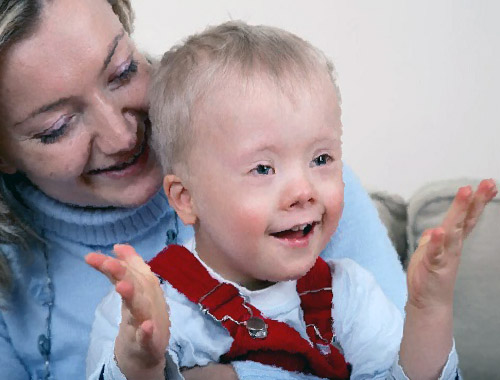Intellectual disability

Published: 18 Jun 2025
ICD9: 319 ICD10: F72 ICD11: 6A00
Intellectual disability (ID), also known as intellectual developmental disorder, is a disability characterized by significant limitations in both intellectual functioning and adaptive behavior, which originate before the age of 18.
It's not simply low intelligence as measured by an IQ test. It's about how well a person functions in everyday life.
Here's a breakdown of the key elements:
![]() Intellectual Functioning (IQ): This refers to general mental capacity, such as learning, reasoning, problem-solving, judgment, and abstract thinking. It's typically assessed using standardized intelligence tests. A score of 70-75 or below (approximately two standard deviations below the mean) is often used as a guideline, but clinical judgment is also crucial.
Intellectual Functioning (IQ): This refers to general mental capacity, such as learning, reasoning, problem-solving, judgment, and abstract thinking. It's typically assessed using standardized intelligence tests. A score of 70-75 or below (approximately two standard deviations below the mean) is often used as a guideline, but clinical judgment is also crucial.
![]() Adaptive Behavior: This refers to the collection of conceptual, social, and practical skills that people learn and use to function in their everyday lives. It includes:
Adaptive Behavior: This refers to the collection of conceptual, social, and practical skills that people learn and use to function in their everyday lives. It includes:![]()

![]() Conceptual Skills: Language, reading, writing, math, reasoning, knowledge, and memory.
Conceptual Skills: Language, reading, writing, math, reasoning, knowledge, and memory.![]()

![]() Social Skills: Empathy, social judgment, interpersonal communication, the ability to make and retain friendships, and similar capacities.
Social Skills: Empathy, social judgment, interpersonal communication, the ability to make and retain friendships, and similar capacities.![]()

![]() Practical Skills: Self-care, job skills, money management, recreation, using transportation, following schedules and routines, and safety.
Practical Skills: Self-care, job skills, money management, recreation, using transportation, following schedules and routines, and safety.
![]() Onset Before Age 18: The limitations must be present before adulthood. This helps to distinguish ID from cognitive impairments that result from brain injury or disease later in life.
Onset Before Age 18: The limitations must be present before adulthood. This helps to distinguish ID from cognitive impairments that result from brain injury or disease later in life.
Levels of Intellectual Disability:
Intellectual disability is often classified by severity, based on the level of adaptive functioning. This classification system focuses on what supports are needed to enable the individual to participate and be successful in various settings. The DSM-5 (Diagnostic and Statistical Manual of Mental Disorders, 5th Edition) emphasizes adaptive functioning over IQ scores in determining severity levels:
![]() Mild: Individuals may have some difficulties in learning academic skills. With appropriate support, they can often achieve independence in many areas of life.
Mild: Individuals may have some difficulties in learning academic skills. With appropriate support, they can often achieve independence in many areas of life.
![]() Moderate: Individuals may have significant limitations in learning and adaptive behavior. They often require ongoing support to live and work in the community.
Moderate: Individuals may have significant limitations in learning and adaptive behavior. They often require ongoing support to live and work in the community.
![]() Severe: Individuals have significant limitations in intellectual and adaptive functioning and require substantial support to participate in daily activities.
Severe: Individuals have significant limitations in intellectual and adaptive functioning and require substantial support to participate in daily activities.
![]() Profound: Individuals have very significant limitations in intellectual and adaptive functioning and require extensive support for all aspects of daily living.
Profound: Individuals have very significant limitations in intellectual and adaptive functioning and require extensive support for all aspects of daily living.
Causes of Intellectual Disability:
Many factors can contribute to intellectual disability. In some cases, the cause is unknown. Known causes include:
![]() Genetic Conditions: Down syndrome, Fragile X syndrome, Prader-Willi syndrome, etc.
Genetic Conditions: Down syndrome, Fragile X syndrome, Prader-Willi syndrome, etc.
![]() Problems During Pregnancy: Fetal alcohol syndrome, infections, malnutrition, exposure to toxins.
Problems During Pregnancy: Fetal alcohol syndrome, infections, malnutrition, exposure to toxins.
![]() Problems During Birth: Oxygen deprivation, premature birth.
Problems During Birth: Oxygen deprivation, premature birth.
![]() Problems After Birth: Infections (e.g., meningitis, encephalitis), head injuries, stroke.
Problems After Birth: Infections (e.g., meningitis, encephalitis), head injuries, stroke.
![]() Environmental Factors: Neglect, abuse, poverty, lack of access to healthcare or education.
Environmental Factors: Neglect, abuse, poverty, lack of access to healthcare or education.
Important Considerations:
![]() Language: It's important to use respectful and person-first language. Instead of saying "a mentally retarded person," say "a person with an intellectual disability."
Language: It's important to use respectful and person-first language. Instead of saying "a mentally retarded person," say "a person with an intellectual disability."
![]() Diversity: People with intellectual disabilities are diverse, with varying strengths, needs, and abilities.
Diversity: People with intellectual disabilities are diverse, with varying strengths, needs, and abilities.
![]() Support: Individuals with intellectual disabilities can lead fulfilling lives with appropriate support and services. This includes educational support, vocational training, residential services, and social support.
Support: Individuals with intellectual disabilities can lead fulfilling lives with appropriate support and services. This includes educational support, vocational training, residential services, and social support.
![]() Stigma: It's crucial to reduce the stigma associated with intellectual disability and promote inclusion and acceptance.
Stigma: It's crucial to reduce the stigma associated with intellectual disability and promote inclusion and acceptance.
In summary, intellectual disability is a complex condition that affects both intellectual functioning and adaptive behavior, impacting a person's ability to function in daily life. The focus is on providing appropriate support to enable individuals with ID to reach their full potential and participate fully in their communities.